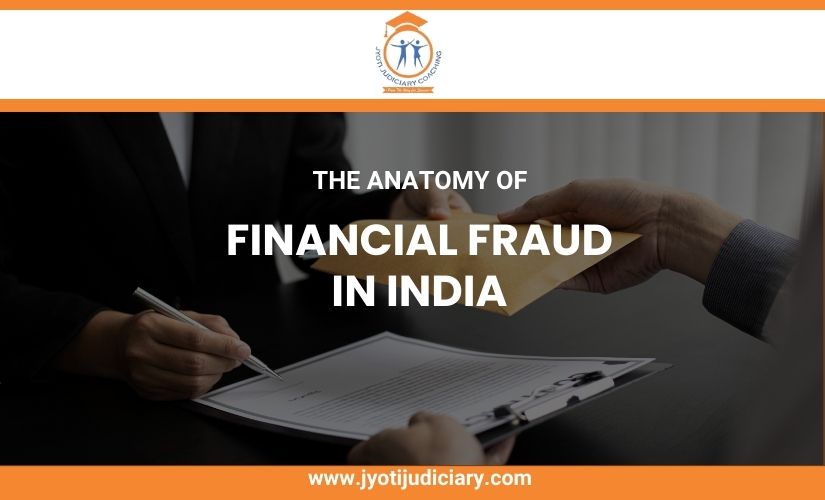
In India, financial fraud is a widespread issue that poses serious difficulties for investors, banking institutions, and the economy as a whole. The financial system’s authenticity and confidence are being compromised by an ongoing pattern of fraudulent acts, despite advancements in technology and regulatory efforts.
Financial Fraud in India
Giving a single, comprehensive definition of financial fraud is challenging. Financial fraud is defined as an unlawful conduct that aims to defraud you of your money for one’s own benefit. Financial fraud entails:
- The deliberate use of deceit in financial dealings for one’s own benefit.
- Obtaining assets or money from someone by deceit.
- Financial resource management that is both unethical and illegal.
- Fabrication and manipulation of accounting documents.
- Intentionally omitting or misrepresenting quantities, using accounting rules incorrectly, and
- Labelling disclosures as misleading or untrue.
Bank frauds in india
- A deliberate act of omission or conduct by any individual during a banking transaction or in the bank’s books of accounts that results in any kind of unlawful temporary advantage for any individual or other party, with or without monetary loss to the bank, is referred to as bank fraud.
- The losses incurred by banks due to fraud are equivalent to the total losses resulting from crimes like theft, burglary, dacoity, and robbery combined.
- Unauthorized credit facilities, such as cash credit permitted against the pledge of goods, the hypothecation of goods against bills, or the repayment of book debts, are provided for illicit gratification.
Financial scams in india
- Ponzi Schemes: An investment scam known as a “Ponzi scheme” uses funds acquired from subsequent participants to make profits for initial investors. The victims of this kind of fraud are promised enormous returns with little to no risk.
- Pyramid Schemes: A pyramid scheme, often referred to as a chain referral system, is a fraudulent business model in which members are recruited and paid based on their capacity to acquire new members. The whole operation becomes unsustainable as the membership grows to the point that it is no longer possible to recruit new members.
- Identity Theft: The use of someone else’s identifying information without that person’s consent is known as identity theft. Identity theft is when someone deceitfully obtains your personal financial information, such as your bank account number, and utilizes it for financial benefit.
- Embezzlement: The act of stealing, misappropriating, or holding onto money by someone who has been given access to it by a company or organization is known as embezzlement.
- Tax Fraud: The manipulation of tax returns to avoid paying taxes to the government is referred to as tax fraud.
- Fraud involving Insurance: Insurance fraud happens when a claimant falsely attempts to get a claim from the insurance company to which he is not entitled, or when the insurance company purposefully refuses a claim to which the claimant is lawfully entitled.
Biggest financial frauds in india
The biggest money fraud cases in india are as follows:
Kingfisher scams: Ten billion rupees
- After Vijaya Mallya’s airline, Kingfisher Airlines Ltd. filed for bankruptcy in 2013, he was accused of owing over Rs 10,000 crore to over a dozen Indian banks. It was among the most famous company fraud cases in india.
Nirav Modi PNB scandal: 14 billion rupees
- It is the case of the latest financial frauds in india. Diamond trader Nirav Modi and his uncle Mehul Choksi were charged with stealing almost 14,000 crores from Punjab National Bank. This was allegedly done with the help of some bank personnel, careless bank management, and insufficient auditing.
ICICI Videocon scam: Rs 1,875 crore
- In 2012, allegations were made against Venugopal Dhoot, MD of the Videocon group, ICICI Bank CEO Chanda Kochhar, and her husband, Deepak Kochhar, for fabricating faults in loans approved by the bank. Loans totalling Rs 1,875 crore were sanctioned by ICICI Bank for the Videocon Group and its affiliates. It was discovered that the great majority of these loans directly violated ICICI Bank norms and banking regulations.
The goal is to minimize fraud chances and shorten the time it takes to uncover fraud by improving procedures, controls, and fraud risk management frameworks by creating a cashless economy. In order to assist banks in identifying borrower fraud cases at an early stage, the RBI also established a Central Fraud Registry Portal, a searchable database. All Indian banks have access to the portal.
Financial Fraud in India FAQs
1. What are the causes of financial frauds in India?
In India, account takeovers account for over half of all occurrences of banking fraud; third-party account takeovers account for about 55% of frauds, which is much larger than social engineering scams, which are the main source of fraud in some other nations.
2. What is the nature of financial fraud?
Financial fraud occurs when someone uses dishonest, fraudulent, or other unlawful methods to steal your money or negatively impact your financial situation. Numerous techniques, including investment fraud and identity theft, might be used to accomplish this.
3. What is the legal action for financial fraud?
According to Section 447 of the Companies Act 2013, the maximum penalty for fraud is a fine equal to three times the amount of the fraud, not less than the amount involved in the fraud, and a term of imprisonment that cannot be less than six months nor more than ten years.
4. What are the indicators of financial fraud?
Indicators of fraud pertaining to inflated, fraudulent, or duplicate invoices consist of, but are not restricted to: Purchase orders or receipts for products or services that have been invoiced that are either missing or duplicated. submission of invoices that are not authentic or validated. Payment for the invoice is either a rounded figure or odd given the circumstances.
5. Who investigates financial fraud in India?
Experts in accounting, forensic auditing, law, information technology, investigation, company law, capital markets, and taxation make up the multidisciplinary Serious Fraud Investigation Office, which is part of the Ministry of Corporate Affairs. Its mission is to identify, investigate, prosecute, or recommend the prosecution of white-collar crimes and frauds. Comprehensive details are provided on reporting fraud, recruitment policies, and organizational structure, among other things.
6. What are the causes of financial frauds?
- Some may engage in it as a result of financial difficulties.
- Some people might not be aware that what they’re doing is illegal and believe it to be harmless.
- A select few might take a more methodical and intentional approach, hoping to profit at the expense of other policyholders.
7. What are the exceptions to fraud?
These exclusions include performance, admittance, and promissory estoppel. If the other party acknowledges under oath that the oral contract was made, admission permits enforcement of the agreement without the need to comply with the statute of frauds. Performance can refer to either a partial or complete performance.
8. How do frauds work?
Fraud is the act of someone deceiving you, or “scamming,” you in order to obtain a benefit, like stealing your money or discovering personal information about you. This could be communicated by phone, text, email, or in person on the street or at your door. Certain folks could be more susceptible to financial abuse and fraud than others.
8. What are the effects of financial fraud?
Because it gives con artists a competitive edge and drives out honest companies, fraud can skew markets. It might affect commercial services and make other industries more vulnerable to fraud. Additionally, it might make things harder for nonprofit organizations and neighbourhood programs that help victims of fraud.
With the goal of giving students the best coaching available for law entrance exams including the CLAT, AILET, and various other numerous state judiciary exams, Jyoti Judiciary Coaching, India’s Finest educational Platform, was established. Come enrol now with Jyoti Judiciary!
For any latest news, legal topics, judiciary exams notifications, patterns, etc watch Jyoti Judiciary’s YouTube channel for legal videos for any updates at https://youtube.com/@jyotijudiciarycoaching4852?si=2cwubh9d2A9urwJf









